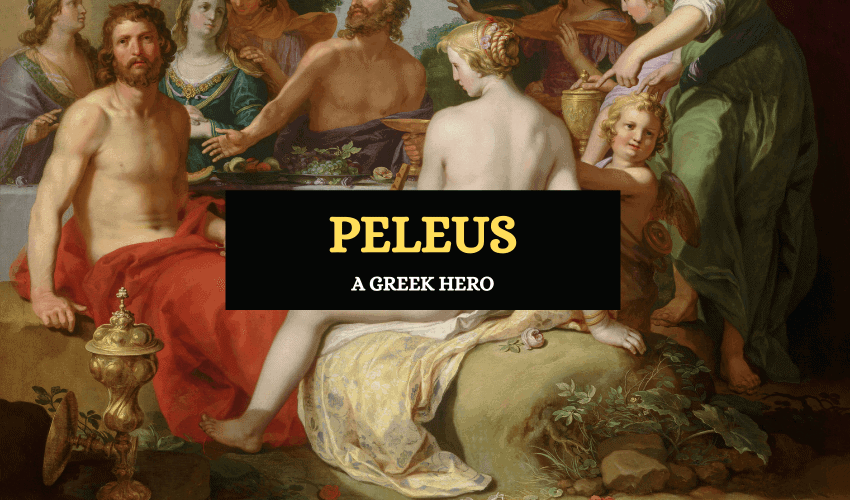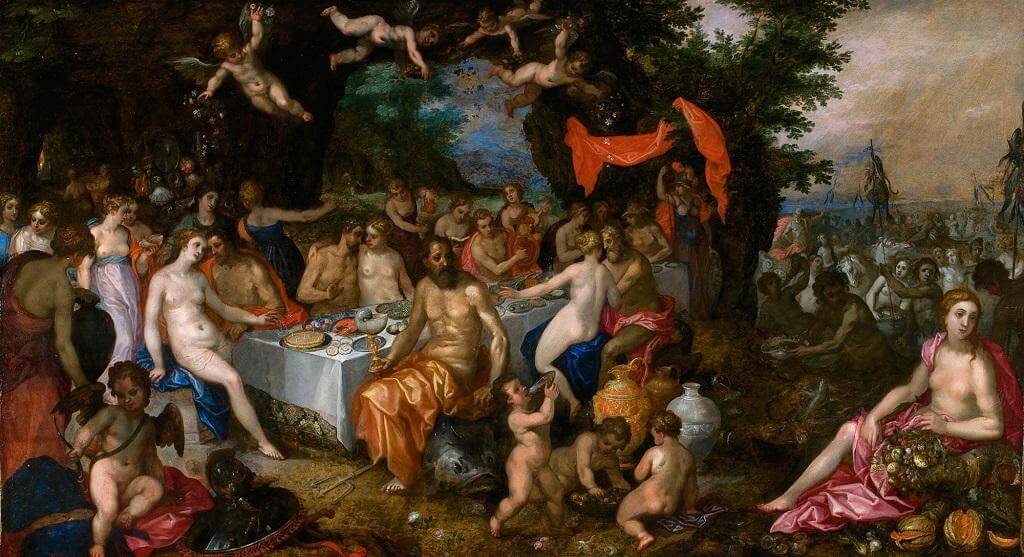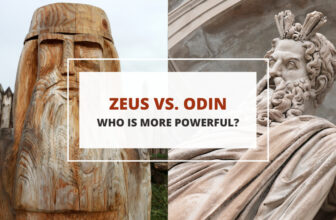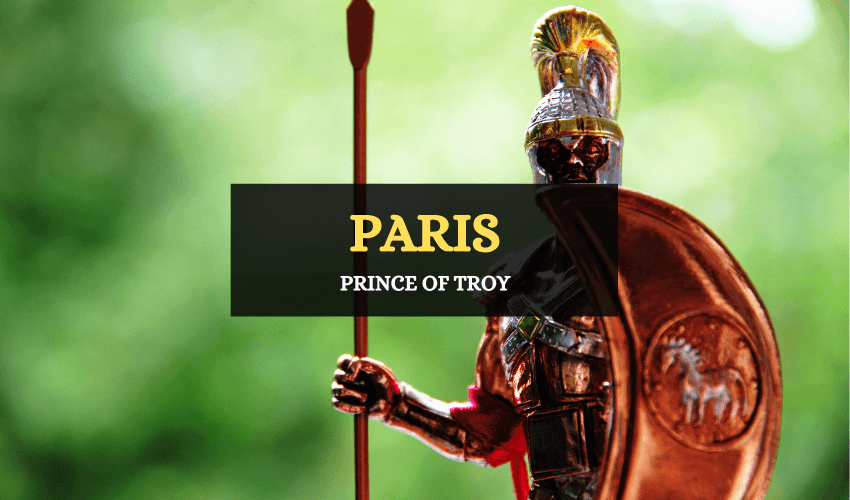
Table of Contents
Peleus was a hero of great significance in Greek mythology. He participated in the hunt of the Calydonian Boar and one of the Argonauts who accompanied Jason on his quest to Colchis in search of The Golden Fleece.
Peleus’ position as one of the greatest Greek heroes was later overshadowed by an even greater hero, his own son Achilles.
Who Was Peleus?
Peleus was an Aegean prince, born to King Aeacus of Aegina and his wife Endeis. He had two siblings – a brother, Prince Telamon, who was also a noted hero, and a step-brother called Phocus, who was the off-spring of Aeacus and his mistress, the Nereid nymph Psamathe.
Phocus quickly become Aeacus’ favorite son and everyone in the royal court envied him because of this. His own step-brothers were jealous of him since he was far more skilled than they were at athletics. Even Peleus’ mother Endeis was incredibly jealous of Phocus’ mother.
The Death of Peleus’ Brother, Phocus
Unfortunately for Phocus, he met his untimely death during an athletic contest where he was hit in the head by a large quoit thrown by one of his brothers. He was killed instantly. While some writers say that his death was an accident, others say that it was a deliberate act by either Peleus or Telamon. In an alternate version of the story, Phocus was killed by his brothers when they were out hunting.
King Aeacus was heartbroken at the death (or murder) of his favorite son and as a result, he banished both Peleus and Telamon from Aegina.
Peleus is Exiled
Peleus and Telamon decided to go their separate ways, now that they were exiled. Telamon traveled to the island of Salamis and settled down there, whereas Peleus traveled to the city of Phthia, in Thessaly. Here, he joined the court of the Thessalian king, Eurytion.
In Ancient Greece kings had the power to absolve people of their crimes. King Eurytion absolved Peleus for killing his brother, whether deliberately or by accident. The king had a beautiful daughter named Antigone and because he was so taken with the Aegean prince, he decided to give him her hand in marriage. Antigone and Peleus were married and Eurytion gave Peleus one third of his kingdom to rule over.
Together, Peleus and Antigone had a daughter whom they called Polydora. In some accounts, Polydora is said to be the mother of Menesthius, the leader of the Myrmidons who fought in the Trojan War. In others, she’s mentioned as the second wife of Peleus.
Peleus Joins the Argonauts
Some time after Peleus and Antigone were married, he heard rumors that Jason, the prince of Iolcus, was gathering a band of heroes to journey with him on his quest to find the Golden Fleece. Peleus and Eurytion traveled to Iolcus to join Jason who warmly welcome them as new Argonauts.
Peleus’ was surprised to find his brother Telamon, who had joined Jason’s quest on the journey to and from Colchis, also aboard Jason’s ship, the Argo. Telamon was one of the most vocal critics of Jason’s leadership. Peleus, on the other hand, served as Jason’s counselor, guiding and assisting him with overcoming every obstacle he faced.
Peleus played an important role in the story of the Argonauts since it was he (and not Jason) who rallied the heroes together. He also solved the issue of how to get the Argo across the Libyan deserts.
The Calydonian Boar
Jason’s quest was successful and the Argo safely returned to Iolcus. However, Peleus was unable to return home for he had to take part in the funeral games that were held for the King of Iolcus. King Pelias had unintentionally been killed by his own daughters who had been tricked by the sorceress Medea. In the games, Peleus wrestled with the huntress Atalanta, but her battle skills were far superior to his and he was ultimately defeated by her.
In the meantime, rumors began to spread that the Calydonian King, Oeneus, had neglected to make a sacrifice to the goddess Artemis who sent a dangerous wild boar to ravage the country. As soon as Peleus, Telamon, Atalanta, Meleager and Eurytion heard the news, they all set off for Calydon to slay the deadly beast.
The Calydonian Boar hunt was successful, with Meleager and Atalanta at the forefront. For Peleus, things took a tragic turn. He threw his javelin at the boar but accidentally killed his father-in-law Eurytion instead. Peleus was overcome with grief and returned to Iolcus seeking absolution for his second crime.
Back in Iolcus
In the meantime, Acastus (son of King Pelias) had been crowned the king of Iolcus after his father’s death. Acastus and Peleus were comrades since they’d traveled together on board the Argo. When Peleus arrived at Iolcus, Acastus warmly welcomed him and absolved him of his crime at once. However, Peleus didn’t know that his troubles were far from over.
Astydamia, Acastus’ wife, fell in love with Peleus but he rejected her advances, which angered the queen greatly. She took her revenge by sending a messenger to his wife Antigone, stating that Peleus was to marry one of Acastus’ daughters. Antigone was distraught when she received this news and hanged herself at once.
To make things worse, Astydamia told Acastus that Peleus had tried to rape her. Acastus believed his wife, but because he wasn’t willing to act against his guest, he came up with a plan to have Peleus killed by someone else.
Peleus Escapes Death
Acastus took the unsuspecting Peleus on a hunting trip on Mount Pelion. Mount Pelion was a dangerous place, home to wild animals and centaurs, who were savage half-man, half-horse creatures known for their barbarism. When they stopped to rest on the mountain, Peleus fell asleep and Acastus abandoned him, hiding his sword so he wouldn’t be able to defend himself.
Although Acastus had hoped that Peleus would be killed on the mountain, the hero was found by Chiron, the most civilized centaur. Chiron saved Peleus from a group of centaurs who tried to attack him and he also found Peleus’ sword and returned it to him. He welcomed the hero into his home as his guest and when Peleus left, Chiron presented him with a special spear made of ash.
According to some sources, Peleus rallied an army and then with the help of Castor, Pollux and Jason, he returned to Iolcus to take over the city. He killed Acastus and then dismembered the queen, Astydamia, for her deceitfulness and treachery. Since both the king and queen were dead, the throne passed to Thessalus, Jason’s son.
Peleus and Thetis
Now that Peleus was a widower, Zeus, the god of thunder, decided that it was time to find him a new wife and he chose for him the Nereid nymph Thetis, who was known for her extreme beauty.
Zeus and his brother Poseidon had both pursued Thetis. However, they became aware of a prophecy stating that Thetis’ future son would be more powerful than his father. Neither of the gods wanted to be less powerful than his own son. They arranged for Thetis to wed a mortal since a mortal child wouldn’t pose a threat to the gods.
Although Peleus was chosen as Thetis husband, the nymph had no intention of marrying a mortal and fled from his advances. Chiron, (or in some versions Proteus, the sea god) came to Peleus’ aid, telling him how to capture Thetis and make her his wife. Peleus followed their instructions and was successful in capturing the nymph. Realizing that she had no way out, Thetis agreed to marry him.

The wedding of Peleus and Thetis was a grand event in Greek mythology to which all the Olympian deities were invited, with the exception of one – Eris, the goddess of strife and discord. Eris, however, did not appreciate being omitted and appeared uninvited to disrupt the festivities.
Eris took an apple with the words ‘to the fairest’ on it and threw it towards the guests, causing arguments and discord amongst the goddesses.
This incident led to the judgement of the Trojan Prince, Paris which is why the wedding became known as one of the events that triggered the start of the ten-year-long Trojan War.
Peleus – Father of Achilles
Peleus and Thetis had six sons together but five of them died as infants. The last surviving son was Achilles and just as the prophecy had stated, he became far greater than his father.
When Achilles was just an infant, Thetis tried to make him immortal by covering him up in ambrosia and holding him over a fire to burn away the mortal part of him. However, she was discovered by Peleus who was shocked and angry, thinking she’d tried to hurt the child.
Thetis fled the palace in fear of her husband and Peleus handed Achilles over to the care of the centaur Chiron. Chiron was famous for being the tutor of many great heroes and Achilles was one of them.
In another version of the story, Thetis tried to make Achilles immortal by holding onto his heel and dipping him in the River Styx. However, she didn’t realize that heel hadn’t touch the water and was left vulnerable.
Peleus is Overthrown
Achilles became one of the greatest heroes that ever lived, famed for the role he played in the Trojan War as the leader of the Phthian forces. However, he was killed when Prince Paris shot him through his heel (the only mortal part of Achilles) with an arrow.
The sons of Acastus then rose against Peleus and succeeded in overthrowing him. Not only did Peleus lose his son, but he also lost his kingdom.
In some versions of the story, Neoptolemus, Peleus’ grandson, returned to Phthia after the Trojan War ended and assisted Peleus in regaining his kingdom.
The Death of Peleus
After the Trojan War came to an end, Neoptolemus and his wife Hermione settled down in Epirus. However, Neoptolemus had also taken Andromache (wife of the Trojan Prince Hector) with him as his concubine. Andromache bore sons for Neoptolemus which was something that angered Hermione for she had no sons of her own.
When Neoptolemus was away, Hermione and her father Menelaus threatened to murder Andromache and her sons, but Peleus arrived in Epirus to protect them, thwarting Hermione’s plans. However, he soon received word that his grandson Neoptolemus had been slain by Orestes, son of Agamemnon, and upon hearing this news, Peleus died of grief.
There are many explanations given by various sources about what happened to Peleus after he died but the actual story remains a mystery. Some say that he lived in the Elysian Fields after his death. Others say that Thetis transformed him into an immortal being before he died and the two lived together under the sea.
In Brief
Although Peleus was an important character in Ancient Greece, being overshadowed by his son, Achilles, resulted in the decrease of his fame and popularity. Today, very few know his name but he still remains one of the greatest heroes in Greek history.








